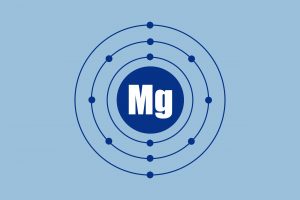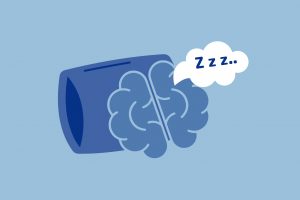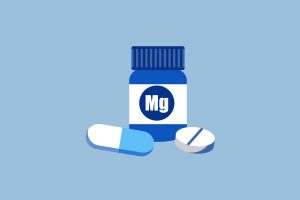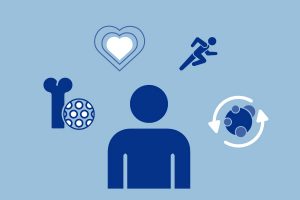Key Takeaways
- Magnesium and Improved Sleep: Magnesium deficiency is linked to insomnia and increasing magnesium intake has been shown to result in longer sleep times, improved sleep efficiency, and reduced instances of early morning awakenings. Magnesium supplementation has been found to positively impact sleep disorders, stress, anxiety, and even conditions like restless leg syndrome.
- Importance of Magnesium for Overall Health: Magnesium is an essential mineral with health benefits beyond sleep improvement. It is necessary for over 300 enzyme reactions in the body, helps maintain muscle health, supports cardiovascular health, regulates stress and anxiety, and contributes to proper digestion and gut health. A magnesium deficiency has been linked to health risks including heart disease, hypertension, stroke, type 2 diabetes, and osteoporosis.
- Sources and Forms of Magnesium: Magnesium can be obtained through a balanced diet rich in magnesium-containing foods, such as dark leafy greens, nuts, seeds, whole grains, and certain fish. If dietary intake is insufficient, magnesium supplements can be considered. Different forms of magnesium supplements, such as magnesium glycinate and magnesium citrate, offer varying benefits.
Your body is already equipped with all the tools you need for a good night’s rest. Sometimes, however, your sleep cycle needs a little fine-tuning. When it comes to getting more quality sleep, there are a lot of remedies to choose from.
One healthy, natural solution to getting better sleep is to incorporate the recommended dose of magnesium, a mineral found in the body and in many foods, into your diet. Magnesium, along with its myriad of other health benefits, can help you fall asleep deeper and quicker, leaving you more rejuvenated for the day ahead.
While a great deal of research has been done on the subject, there is a spectrum of controversial, yet scientific opinions about the link between sleep and magnesium. An overwhelming majority of the current research reports a positive correlation between the two.
What is Magnesium?
 Magnesium is one of the 24 essential vitamins and minerals humans need to maintain a healthy lifestyle. Few dietary minerals are more influential to your body’s
physical and mental health.
Verified Source
National Library of Medicine (NIH)
World’s largest medical library, making biomedical data and information more accessible.
View source
We’ll explore some of the additional benefits below.
Magnesium is one of the 24 essential vitamins and minerals humans need to maintain a healthy lifestyle. Few dietary minerals are more influential to your body’s
physical and mental health.
Verified Source
National Library of Medicine (NIH)
World’s largest medical library, making biomedical data and information more accessible.
View source
We’ll explore some of the additional benefits below.
While our bodies need large quantities of this essential mineral, we do not produce magnesium independently, and therefore must rely on diet or supplements to get the recommended dose. The National Institutes of Health Verified Source National Library of Medicine (NIH) World’s largest medical library, making biomedical data and information more accessible. View source recommends 310-320 mg a day for women ages 19 and older; men in the same age bracket should take 400-420 mg a day.
On average, a healthy adult will have about 25 mg of magnesium in their system, well below the recommended levels. About half of your magnesium is found in your bones. The other 40-50 percent is in your soft tissue.
Sixty-eight percent of American adults do not consume enough magnesium Verified Source National Library of Medicine (NIH) World’s largest medical library, making biomedical data and information more accessible. View source in their diet or through supplemental means. In addition to poor sleep, other negative side effects linked to a magnesium deficiency include hypertension, cardiovascular disease, Vitamin D deficiency, and type 2 diabetes.
How Does Magnesium Improve Sleep?
 Many people with a magnesium deficiency suffer from insomnia. Women especially are prone to low levels of magnesium.
Several studies
Verified Source
National Library of Medicine (NIH)
World’s largest medical library, making biomedical data and information more accessible.
View source
have shown that increasing your magnesium intake improves your sleep performance.
Many people with a magnesium deficiency suffer from insomnia. Women especially are prone to low levels of magnesium.
Several studies
Verified Source
National Library of Medicine (NIH)
World’s largest medical library, making biomedical data and information more accessible.
View source
have shown that increasing your magnesium intake improves your sleep performance.
Magnesium effectively reduced insomnia Verified Source National Library of Medicine (NIH) World’s largest medical library, making biomedical data and information more accessible. View source among elderly adults, according to an Iranian study in 2012. The study reported that nearly 50 percent of older adults suffer from insomnia.
When study participants added magnesium supplements to their diets, they experienced longer sleep times, fewer early morning wakings, and better sleep efficiency (the amount of time spent in bed compared to the amount of time asleep).
GABA Levels and Magnesium
Some people suffer from insomnia because they can’t seem to turn their brain off at night. Magnesium helps to calm the nervous system, decreasing anxiety and slowing down your thinking at night by regulating a neurotransmitter called GABA. Verified Source National Library of Medicine (NIH) World’s largest medical library, making biomedical data and information more accessible. View source
GABA (short for Gamma-Aminobutyric acid) is an important amino acid that plays a key role in your overall sleep health. One of the primary functions of GABA is, essentially, to help your brain power down for the night. This neurotransmitter slows down the communication between your brain and your central nervous system, helping you relax, de-stress, and ultimately, fall asleep.
Magnesium helps your body maintain healthy levels of GABA, Verified Source National Library of Medicine (NIH) World’s largest medical library, making biomedical data and information more accessible. View source allowing for more restorative sleep. Additionally, GABA can help calm both body and mind while you prepare for sleep. This calming ritual is a natural boost to your circadian rhythms.
Think of your circadian rhythm as your internal clock.
“It causes your brain to release melatonin when the sun goes down so you can fall asleep and then decreases melatonin so you can wake up when the sun rises,” says Robins.
A healthy circadian rhythm is therefore a natural routine that allows for deeper, quality sleep.
Supplemental Magnesium Regulates Stress and Anxiety
German scientists recently tested the link between magnesium and stress Verified Source National Library of Medicine (NIH) World’s largest medical library, making biomedical data and information more accessible. View source when it comes to sleep. Their results found that increasing the participant’s daily magnesium intake helped participants regulate both the sympathetic and parasympathetic nervous systems.
Regulating these two systems is critical for healthy sleep. The parasympathetic nervous system, often called the “rest and digest” system, allows your body to prepare for sleep by slowing down your heart rate and relaxing other systems in your body. The sympathetic nervous system, on the other hand, is also known as your “fight-or-flight” response system, leaving you in a heightened state of arousal.
When these two systems reach equilibrium through the use of magnesium supplements, participants in the German study Verified Source National Library of Medicine (NIH) World’s largest medical library, making biomedical data and information more accessible. View source saw a decrease in sleep disorders, irritability, poor concentration, and depression.
Restless Leg Syndrome
In addition to improving your overall quality of sleep, magnesium can also improve restless leg syndrome, a condition that causes insomnia and may affect up to 10 percent of the population.
Restless leg syndrome is a disorder Verified Source Mayo Clinic Ranked #1 hospital by U.S. News & World Report and one of the most trusted medical institutions in the world. The staff is committed to integrated patient care, education, and research. View source that causes an uncomfortable and uncontrollable urge to move your legs. The disconcerting sensation has also been described by some as a “pins and needles” feeling. According to Michele Roberge, RT(R), RPSGT, “Restless leg syndrome can happen during the day or night, usually during or just after periods of inactivity and is usually relieved with activity. [Because of that,] RLS can be exacerbated at bedtime while inactive and trying to fall asleep.” To relive the sensation, many people move their legs around, often keeping themselves awake during the night.
Roberge adds, “The parasomnia ([a] disorder that occurs during sleep) that is commonly associated with RLS is known as Periodic Limb Movement Disorder. PLMD is [the] rhythmic movement of the limbs, most commonly the legs, during sleep. According to The Cleveland Clinic Guide to Sleep Disorders by Nancy Foldvary-Schaefer, DO approximately 80% of patients with RLS also suffer from PLMD.”
While treatment for restless leg syndrome is still evolving, a Mayo Clinic study Verified Source Mayo Clinic Ranked #1 hospital by U.S. News & World Report and one of the most trusted medical institutions in the world. The staff is committed to integrated patient care, education, and research. View source found magnesium was an effective form of natural therapy.
Other studies have also shown that magnesium salts have been beneficial in reducing leg cramps in pregnant women. Additional research indicates that magnesium citrate has helped alleviate nighttime leg aches, cramps, and pains in all adults, not just pregnant women.
“It can cause stomach cramps and diarrhea,” notes Robins. “Great to use if you are constipated.”
Digestion and Gut Health
Magnesium is important to gut health, a relatively new branch of research. One of the jobs of magnesium is to relax muscles in the stomach and intestines, neutralize stomach acids, and promote a healthy digestive tract.
For this reason, high doses of magnesium are often used to relieve constipation and soothe heartburn. A diet of magnesium-rich foods helps to offset these uncomfortable conditions that have direct ties to the gut.
While research examining the link between magnesium and gut health is in its primitive stages, a 2018 study Verified Source National Library of Medicine (NIH) World’s largest medical library, making biomedical data and information more accessible. View source using male rats found that a diet high in magnesium led to a healthy gut among its test subjects.
Additional research out of Denmark found that adults deficient in magnesium may be more prone to symptoms of depression and anxiety because of an imbalance of healthy microbiota Verified Source National Library of Medicine (NIH) World’s largest medical library, making biomedical data and information more accessible. View source in the gut.
Depression and Mood
Depression and other mood disorders can impair sleep, causing restlessness and insomnia. These disorders are incredibly widespread. According to the World Health Organization, more than 263 million people Verified Source World Health Organization (WHO) United Nations agency whose stated goal is to improve the health of all. View source of all ages across the globe suffer from depression.
Magnesium has been shown to be an effective natural treatment. A study published in the Journal of the American Board of Family Medicine found a link between magnesium supplementation and fewer symptoms of depression. This link was even higher in younger adults.
Though prior research had been inconclusive, this 2015 study found that magnesium impacts several neurotransmitters that affect depression. Overall, when participants took higher doses of magnesium, their depressive symptoms improved. Magnesium was also found to improve additional mood disorders such as postpartum depression and chronic fatigue.
Muscle Health
Magnesium works in tandem with other essential vitamins and minerals like calcium and potassium. Because of this, magnesium plays a key role in how well your muscles— including your heart— function.
Additionally, magnesium helps your muscles to contract and as a result, produce energy and protein. This is because magnesium works with more than 300 enzymes in your body to allow it to function properly.
Sources of Magnesium
There are many ways to up your magnesium intake if you want to regulate or increase this essential mineral in your system. The most common are diet and supplements.
Magnesium in Food
 If you’re looking to up your magnesium intake, examine your diet first. Harvard Medical School reports that most people
get enough magnesium
Verified Source
Harvard Health
Blog run by Harvard Medical School offering in-depth guides to better health and articles on medical breakthroughs.
View source
from a healthy diet with foods high in magnesium. Additionally, some processed foods strip away nutrients, drastically lowering the magnesium content within the food. We recommend eating whole, unprocessed foods for the best source of dietary magnesium.
If you’re looking to up your magnesium intake, examine your diet first. Harvard Medical School reports that most people
get enough magnesium
Verified Source
Harvard Health
Blog run by Harvard Medical School offering in-depth guides to better health and articles on medical breakthroughs.
View source
from a healthy diet with foods high in magnesium. Additionally, some processed foods strip away nutrients, drastically lowering the magnesium content within the food. We recommend eating whole, unprocessed foods for the best source of dietary magnesium.
The US Department of Agriculture has identified the following foods as the richest in magnesium, listed in descending order: almonds, spinach (boiled), cashews, peanuts, and shredded wheat cereal.
Magnesium-rich foods include:
- Dark leafy greens
- Seeds and nuts, especially cashews, almonds, sunflower seeds, pumpkin seeds, chia seeds and sesame seeds
- Squash, broccoli
- Peanut butter
- Legumes
- Soymilk
- Dairy
- Avocado
- Bananas
- Salmon, halibut
- Beef, chicken breast
Supplemental Magnesium
 If your diet is still not giving you the recommended daily dose of this essential mineral, many supplemental options for magnesium are available at your local drug store. While it comes in many forms, all of which will help regulate your GABA levels and lead to restful sleep, knowing the different types of dietary supplements available can be helpful.
If your diet is still not giving you the recommended daily dose of this essential mineral, many supplemental options for magnesium are available at your local drug store. While it comes in many forms, all of which will help regulate your GABA levels and lead to restful sleep, knowing the different types of dietary supplements available can be helpful.
When you’re making your selection either online or at the drugstore, keep in mind that some magnesium supplements include a blend of different types of magnesium, whereas some you can purchase individually.
Magnesium Glycinate
Glycine is another sleep-inducing amino acid. One form of supplemental magnesium is magnesium glycinate. This is one of the most absorbable forms of magnesium Verified Source National Library of Medicine (NIH) World’s largest medical library, making biomedical data and information more accessible. View source you can take. Studies have shown that glycine improves sleep quality, Verified Source Wiley Multinational publishing company specializing in academic and instructional materials. View source and promotes natural, healthy sleep patterns, including healthy REM cycles.
Magnesium glycinate is normally included in many over-the-counter magnesium supplements, but always be sure to check, as it is recommended especially for improving sleep.
Magnesium Citrate
Feeling stressed or tense? Consider upping your magnesium citrate intake.
Many common magnesium supplements contain magnesium citrate. In addition to soothing muscle cramps, magnesium citrate has calming properties, helping your mind and body relax.
Magnesium Oil
 Magnesium oil is a topical remedy that can help relax your muscles as well as boost the health of your skin. It is most often a mixture of water and magnesium chloride. Many people use it for its calming purposes in baths or as a topical oil, as it’s also sold in a spray form.
Magnesium oil is a topical remedy that can help relax your muscles as well as boost the health of your skin. It is most often a mixture of water and magnesium chloride. Many people use it for its calming purposes in baths or as a topical oil, as it’s also sold in a spray form.
While no concrete research has proven the benefits of magnesium oil, it is still a popular option for a magnesium supplement.
Other common forms of magnesium include magnesium sulfate (found in Epsom salts), magnesium oxide, magnesium threonate, and magnesium malate. If you’re uncertain or experience any adverse side effects, be sure to talk with your doctor.
What Happens When You Don’t Have Enough Magnesium?
 Most people suffer consequences from a vitamin or mineral deficiency and magnesium is no exception. A 2012 study from the International Life Sciences Institute reported that some
health risks
Verified Source
National Library of Medicine (NIH)
World’s largest medical library, making biomedical data and information more accessible.
View source
from a magnesium deficiency include type 2 diabetes, migraine headaches, asthma, colon cancer, and hypertension to name a few.
Most people suffer consequences from a vitamin or mineral deficiency and magnesium is no exception. A 2012 study from the International Life Sciences Institute reported that some
health risks
Verified Source
National Library of Medicine (NIH)
World’s largest medical library, making biomedical data and information more accessible.
View source
from a magnesium deficiency include type 2 diabetes, migraine headaches, asthma, colon cancer, and hypertension to name a few.
Let’s give a quick look at some health conditions that can result from a magnesium deficiency.
- Cardiovascular disease: Though the prevalence of heart disease is both devastating and wide-spread, research has shown that higher levels of magnesium showed a reduced risk of both cardiovascular disease Verified Source National Library of Medicine (NIH) World’s largest medical library, making biomedical data and information more accessible. View source and heart disease.
- Hypertension: Low magnesium levels for an extended period of time may be connected with hypertension and cardiovascular disease. While studies Verified Source National Library of Medicine (NIH) World’s largest medical library, making biomedical data and information more accessible. View source have shown that supplemental magnesium and a diet of magnesium-rich foods only helped lower blood pressure marginally, we recommend a lifelong effort of maintaining healthy magnesium levels.
- Stroke: One NIH study Verified Source National Library of Medicine (NIH) World’s largest medical library, making biomedical data and information more accessible. View source showed that higher doses of magnesium (an additional 100 mg a day) decreased the risk of stroke by 8 percent in the study participants.
- Type 2 diabetes: Because of magnesium’s critical role in balancing glucose levels, diets rich in magnesium are linked to a significantly lower risk of diabetes, according to the National Institutes of Health.
- Osteoporosis: Because it activates the essential, bone-fortifying elements found in Vitamin D, magnesium is critical to healthy bone development, Verified Source National Library of Medicine (NIH) World’s largest medical library, making biomedical data and information more accessible. View source and has also been shown to ward off osteoporosis.
- Migraine headaches: Though research in this area is limited, there is enough evidence to support the idea that magnesium therapy— high doses of magnesium prescribed by a healthcare professional— could be beneficial in treating migraine headaches.
Additional Health Benefits of Magnesium
 While a pattern of better, restorative sleep can improve your overall health, magnesium also touts additional health benefits.
While a pattern of better, restorative sleep can improve your overall health, magnesium also touts additional health benefits.
Magnesium assists more than 300 enzymes in your body, keeping you feeling balanced and healthy. Additional mental and physical benefits of ingesting or otherwise intaking magnesium include:
- Lower stress, better mood
- Bone health
- Metabolic health
- Pain relief
- Better attention span
- Better athletic performance
Potential Side Effects
Like with all things, moderation is key. Always be sure to follow the recommended dosages and any advice from your healthcare provider.
Some people experience stomach cramping after taking too much magnesium (around 600 mg a day). This high dosage, especially supplements with large doses of magnesium oxide and mag citrate, can cause a laxative effect, ironically keeping you up at night, rather than providing the sleep-inducing benefits it’s well-known for.
Though your body will naturally void any excess vitamins and minerals, your kidneys ensure you don’t excrete too much magnesium because of your body’s need for it. Even still, we recommend being mindful of how much you’re consuming regularly, and always talk to your doctor should you have additional concerns.
Some drugs interact poorly with magnesium, so be sure to check with your doctor before beginning any supplemental regimen. If you have chronic kidney disease, Verified Source Harvard Health Blog run by Harvard Medical School offering in-depth guides to better health and articles on medical breakthroughs. View source we recommend only using supplements prescribed by your doctor.

FAQs
Which form of magnesium is best for sleep?
Because it’s combined with an additional sleep aid and amino acid, glycine, magnesium glycinate is one of the most common magnesium supplements used for achieving better sleep.
Is magnesium or melatonin better for sleep?
While both can act as a sleep aid, magnesium and melatonin perform different roles in the body. Melatonin is a hormone and antioxidant; magnesium is a mineral. While they can both help you to fall asleep quickly, we recommend learning the differences in how each substance works with your body to fall asleep. We caution against relying on any supplement to help you sleep; first, focus on your sleep hygiene and sleep habits.
What is the best time to take magnesium?
If you plan on using magnesium supplements as a sleep aid, we recommend taking it 1-2 hours before heading to bed. Consider adding magnesium to your sleep routine.
Can magnesium cause insomnia?
Magnesium does not cause insomnia. A magnesium deficiency, however, can. As discussed above in this article, we recommend healthy doses of magnesium through diet or supplements to help combat insomnia.
About the author
McKenzie Hyde is a Certified Sleep Science Coach and a full-time writer specializing in sleep health and the mattress industry. With a Master of Arts degree in literature and writing from Utah State University, McKenzie combines her passion for writing with her in-depth knowledge of sleep science. Her articles cover a wide range of topics, including best sleep practices for students, the consequences of sleep deprivation, and choosing the right mattress for back pain relief. McKenzie's dedication to delivering accurate and informative content makes her a valuable contributor to the field of sleep health.
View all posts




